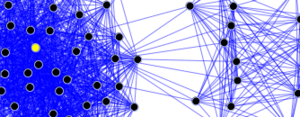 Image via WikipediaOpen textbooks can sustain a community of practitioners in a given field. With commercial texts, and texts that are not truly openly licensed, English instructors can't get together, make decisions about the needs of their students, and change the text. They are often stuck with the text written by the subject matter expert far from the experiences, needs, and location of that community. The instructors then have to create "supplemental materials" to address those needs. And what do we do about fields where information is rapidly changing? For instance, there are too many things happening in instructional design for us to rely on one text; the view point of a single author in a book that is infrequently updated is not enough. The whole idea of a book, a single container of vetted knowledge is nearly useless in an environment where information constantly changes and networks expand at an exponential rate. Instructional designers, and professionals in other fields, need to replace the text with a community. We need a participatory textbook. For that to happen, one needs an open-licensed "text" as defined by the DOE's Notice of Proposed Priorities (also used in a recent Creative Commons blog post):
Image via WikipediaOpen textbooks can sustain a community of practitioners in a given field. With commercial texts, and texts that are not truly openly licensed, English instructors can't get together, make decisions about the needs of their students, and change the text. They are often stuck with the text written by the subject matter expert far from the experiences, needs, and location of that community. The instructors then have to create "supplemental materials" to address those needs. And what do we do about fields where information is rapidly changing? For instance, there are too many things happening in instructional design for us to rely on one text; the view point of a single author in a book that is infrequently updated is not enough. The whole idea of a book, a single container of vetted knowledge is nearly useless in an environment where information constantly changes and networks expand at an exponential rate. Instructional designers, and professionals in other fields, need to replace the text with a community. We need a participatory textbook. For that to happen, one needs an open-licensed "text" as defined by the DOE's Notice of Proposed Priorities (also used in a recent Creative Commons blog post):"Open educational resources (OER) means teaching, learning, and research resources that reside in the public domain or have been released under an intellectual property license that permits their free use or repurposing by others."
and from the original, 2002 UNESCO definition:
"The open provision of educational resources, enabled by information and communication technologies, for consultation, use and adaptation by a community of users for noncommercial purposes."
That is my dream for instructional design - that we are light and adaptable - we can repurpose information according to the diverse needs of students and teachers; that we can adapt to our networks quickly and efficiently because we are not stuck with merely. And from the UNESCO definition that we become a community of users, enabled by information and communication technologies for consultation.
This sounds like a community of users built around a wiki to me. Stay tuned for a different kind of request for articles/chapter/proposal.

No comments:
Post a Comment